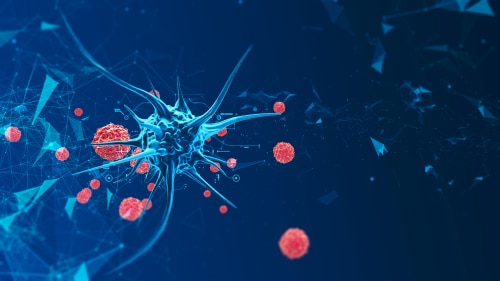ErVaccine Technologies, announces the closing of a €4.5 million ($4.8 million) seed round, including dilutive and non-dilutive funds, with Seventure and Bpifrance as part of the Aide au Développement de l’Innovation (ADI) program.
ErVaccine is a biotech company and spin-off from the Centre Léon Bérard-Centre de Recherche en Cancérologie de Lyon, France, which develops next-generation therapeutic vaccines and cellular immunotherapies targeting “unconventional” tumor antigens, such as those derived from human endogenous retroviruses (HERVs).
These funds are dedicated to financing Ervaccine’s work with its development portfolio, which currently includes nine projects, two of which are in late pre-clinical development.
To prepare for the next stages of development, including the start of a clinical trial with a first vaccine candidate in 2023, Ervaccine is currently preparing an A-round of financing.
‘Immense potential’ of Ervaccine’s technology
Nathalie Donne, CEO of Ervaccine, said: “The work of Ervaccine’s teams, led by Prof. Stéphane Depil, and the support of our strategic investors, Seventure and Bpifrance, have enabled us to decisively advance our preclinical programs and bring us to the doorstep of the first clinical trials.
“Meanwhile, throughout the year, we published numerous non-clinical data of high scientific quality, confirming the immense potential of our technology. These publications have enabled us to make progress in our discussions with several international investors specialized in life sciences, with a view to our next stage of financing, as well as with potential industrial partners.”
Targeting breast cancer
Depil, founder and executive chairman of ErVaccine, said: “Human endogenous retroviruses are fossils of viruses that were integrated into the genome of our ancestors millions of years ago and represent about 8% of our genetic make-up. These genes are silent in normal cells but become active when cells become tumorous. ErVaccine has demonstrated that cancer cells present antigens from HERV to the immune system and has built on this discovery to develop a unique, potentially universal therapeutic vaccine technology platform.
“Our most advanced preclinical assets are targeting triple-negative breast cancer as the first indication. We are also considering other low mutational burden tumors such as ovarian cancer, sarcoma, glioblastoma and acute myeloid leukemia. In these indications, current checkpoint inhibitor immunotherapies are proving to be of little or no benefit, and there remains a major unmet medical need. We are putting everything in place to enter the clinic next year.”
About HERVs
Approximately 8% of the human genome consists of sequences of retroviral origin, namely HERVs. HERVs are remnants of ancient retroviral infections that affected the germ line of primates and their ancestors over the last 100 million years.
HERVs remain silent in normal cells but can be aberrantly expressed by tumor cells. Because of their similarity to viral protein fragments recognized as foreign by the immune system, HERV-derived antigens are prime targets, shared by different tumors, for the development of new cancer vaccines or T-cell based therapies, particularly in tumors that respond poorly to current checkpoint inhibitor (anti-PD1/-PD-L1) immunotherapy approaches.





